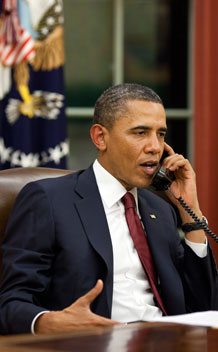One Egyptian’s Advice to Washington
More on:

Hassan ElSawaf, a good friend and sometime guest blogger, has written about the opportunity for the Obama administration to promote democracy in the Middle East. His comments are below.
The recent and still ongoing upheaval among the Arabs has imposed much pressure for change in the world, not least in U.S. foreign policy.
It is time for some soul searching in Washington. The Middle East is no longer a geographical anomaly that can be treated with traditional disdain. Real people with feelings and legitimate demands actually live there. The cozy arrangements it is so conveniently forging with the tyrants enslaving them cannot carry the day anymore. Foreign policy guidelines are in urgent need of a face lift.
Supporting, or at least turning a blind eye to, tyranny has been rudely exposed as a non-starter. It is a short-term policy that unfailingly generates a long-term catastrophe. Flouting natural democratic aspirations is not only unethical, it is highly counterproductive.
Let us assume that democratic promotion among the Arabs has become an aim. Where should the work begin?
It is crucial to convince the Arab people that the United States is not working against democracy. At this point, Washington is not even on the right track. An example of serious intent is indispensable. If the objective is to create a role model that will radiate trust and generate the momentum for sweeping change, what better place to begin than Egypt, the putative leader of the Arabs and their most populous nation?
From the day the uprising began in Egypt, Washington’s reaction has been schizophrenic. Mrs. Clinton first declared that aid to Egypt would be reviewed if force were used to quash the peaceful demonstrations. A few days later she recanted, stating that aid would not be affected. Vice-President Biden made his notorious ‘Mubarak is not a dictator’ declaration in the early days, sending a chill down the spine of naïve protesters. The coup de grace was unleashed with Frank Wisner’s visit with his old buddy Mubarak, in which he did more to protect the man than his staunchest local supporters. Wisner made the Egyptian people feel they were being openly stabbed in the back. Throughout, President Obama was lackluster, never once openly demanding that Mubarak must go.
When an oppressed people rises against a tyrant, fighting incredible odds and facing extreme danger, it deserves support. The protesters did not ask for help, nor did they expect it, for the Egypt uprising was unadulterated, carrying not a whiff of outside influence. Nonetheless, it was strange not to receive unrestrained verbal support from an Obama administration allegedly based on the very demands the intrepid Egyptians rose for: freedom, social justice, democracy, flowery words Americans believe they own. In itself that attitude was still okay; no one claimed they were relying on Washington to come and clean their country for them.
But to be thwarted by Washington in the quest to emulate America was depressing.
It is now clear to all but the most obtuse that Mubarak’s generals have taken over. The conspiracy is plain for all to see, with crimes like sentencing bloggers in military courts and conducting virginity tests by the military on peaceful young female protesters.
Throughout, an alliance between the military and Islamist forces is brewing and the military high command is doing everything in its power to wreak havoc on the streets and spread fear among a weary and apprehensive population as well as trepidation among foreign observers. The aim is to deter democracy demands indefinitely.
Washington understands that but has been dealing with Tantawi, Mubarak’s defense minister for twenty years, as the new de facto president. Whenever a high American official visits Cairo, Tantawi is the first port of call, with even Senator McCain joining the game.
It is time for the charade to end. Some vital questions remain.
Is Washington convinced that old policies of supporting despots are serving its interests? Would it not be better off if it places morality at the forefront of its conditions in dealing with Egypt and forges an honest and long-lasting relationship? Why can it not live with the concept that the best formula is to promote democratic values among the Egyptian people and deal with them as the proud and great people they have proved they are? Is it not playing with fire dealing with a corrupt so-called interim military council no different in its policies from Mubarak’s?
It would be so refreshing to see policies in Washington being based on rational analysis and not on parochial and illogical Israeli-influenced strategy. Condoning despotism is anachronistic and invariably turns friends into monsters. Remember 9/11?
Washington must declare that the military council of Egypt is illegitimate and support the revolution unequivocally. For once, put your money where your mouth is.
No demonstrator dreamed of an onslaught on the American embassy, a stone’s throw from Tahrir Square. Is Washington determined to change that?
More on:
 Online Store
Online Store
